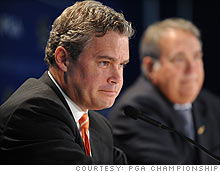Is golf the next Olympic sport?
How Annika Sorenstam and other golf powerhouses banded together to give golf a shot at gold in 2016.
 |
| Ty Votaw, Executive Director, IGF Olympic Golf Committee. |
NEW YORK (Fortune) -- Tiger Woods already has 14 major titles. He could be adding an Olympic medal to his collection soon.
As Woods and his fellow PGA Tour pros teed off at Hazeltine National Golf Club in Chaska, Minn., Thursday for the first round of the PGA Championship, they learned that golf has a strong shot at being included in the 2016 Olympics.
The International Olympic Committee's executive board recommended golf and rugby sevens be added to the games, having heard from the seven finalist sports in June. It's not a done deal until the 106-member IOC assembly casts the final vote in Copenhagen in early October. But it's looking good.
"I think that golf is a truly global sport and I think it should have been in the Olympics a while ago," Woods said Tuesday. He will be 40 by the 2016 Olympics and said he'd play, "if I'm not retired by then."
The news provides a lift to the sport which has suffered major setbacks due to the economic crisis. The LPGA commissioner stepped down last month amid concerns over the the loss of several tournament sponsors, while the PGA Tour announced last week that due to the government-supervised restructuring of GM, Buick will withdraw as the sponsor of two tournaments on that schedule.
The last time golf was part of the world's premiere sporting event was in 1904, when the United States and Canada were the only competing nations. Today, 60 million people play golf in more than 120 countries, with representation from around world on the rosters of professional players. Based on the proposed eligibility guidelines and today's rankings, at least 30 countries would be represented in both the men's and women's competition. Players would compete in 72-hole individual stroke play -- the same format used in golf's major championships.
Golf was up for inclusion in the 1996 games in Atlanta, but it failed in part due to a lack of unified support from the players and golf organizations worldwide. That wasn't a problem this time around.
The International Golf Foundation, which includes representatives from golf's major governing bodies, coordinated the bid, with PGA tour exec Ty Votaw at the helm. Player organizations agreed to shift their competition schedules to accommodate the Olympics, which would likely fall toward the latter half of the prime golf season. Several players lent their support by writing letters to IOC members in their respective countries and appearing in films and brochures used in the presentations to the IOC.
"Lorena Ochoa carries an enormous amount of weight in her own country," Votaw says of the No. 1 women's player, who is from Mexico. "Annika Sorenstam in Sweden. Ernie Els in South Africa. Vijay Singh, there's a vote from Fiji on the IOC board." (PGA Tour player Vijay Singh hails from Fiji.)
Sorenstam has been another key voice in the Olympic push, serving as an ambassador on behalf of the IGF's bid alongside Jack Nicklaus. She also appeared before the IOC board in June with British player Colin Montgomerie.
"It was a tough presentation because we only had 20 minutes to get our message through," Sorenstam says, adding that she was intimidated having "to speak in front of one of the most powerful people in sports in the world."
Sorenstam retired at the end of 2008 to focus on her portfolio of business ventures and her personal life; she was married in January and is expecting her first child. Still, she won't rule out returning to the game, and possibly playing in 2016. "Growing up, I followed the Olympics very closely. I was always wondering what it would be like to take part."
Golf's strong television audience may have been an advantage, and naturally, the golf industry is also behind golf's Olympic bid.
"Every developing golf territory would have state support from both the government side and the sporting infrastructure in those countries to promote our sport of golf," Votaw says.
The IGF has suggested that including golf in the 2016 games won't require constructing new facilities. Indeed, there are plenty of courses available if Chicago, Madrid, or Tokyo is chosen as the host city. Should Rio get the nod however, watch for a stampede of course developers to line up for their own Olympic bid. ![]()
-
 The retail giant tops the Fortune 500 for the second year in a row. Who else made the list? More
The retail giant tops the Fortune 500 for the second year in a row. Who else made the list? More -
 This group of companies is all about social networking to connect with their customers. More
This group of companies is all about social networking to connect with their customers. More -
 The fight over the cholesterol medication is keeping a generic version from hitting the market. More
The fight over the cholesterol medication is keeping a generic version from hitting the market. More -
 Bin Laden may be dead, but the terrorist group he led doesn't need his money. More
Bin Laden may be dead, but the terrorist group he led doesn't need his money. More -
 U.S. real estate might be a mess, but in other parts of the world, home prices are jumping. More
U.S. real estate might be a mess, but in other parts of the world, home prices are jumping. More -
 Libya's output is a fraction of global production, but it's crucial to the nation's economy. More
Libya's output is a fraction of global production, but it's crucial to the nation's economy. More -
 Once rates start to rise, things could get ugly fast for our neighbors to the north. More
Once rates start to rise, things could get ugly fast for our neighbors to the north. More







